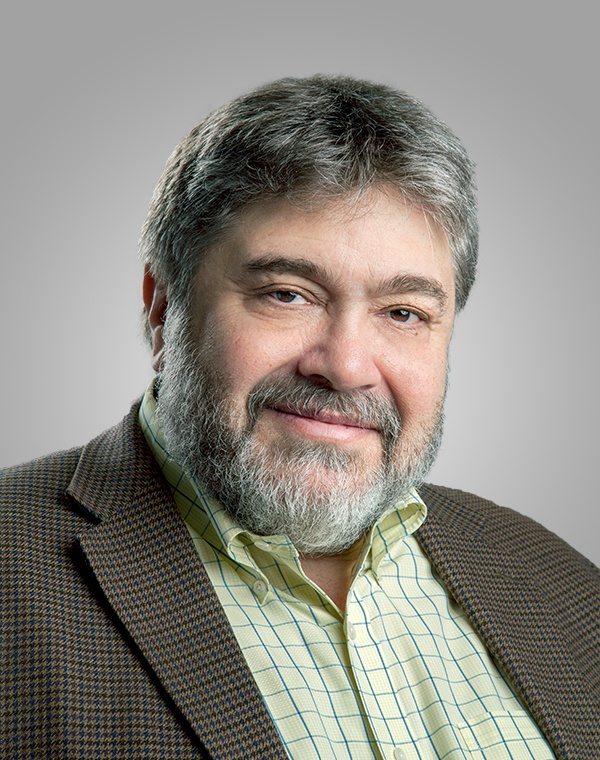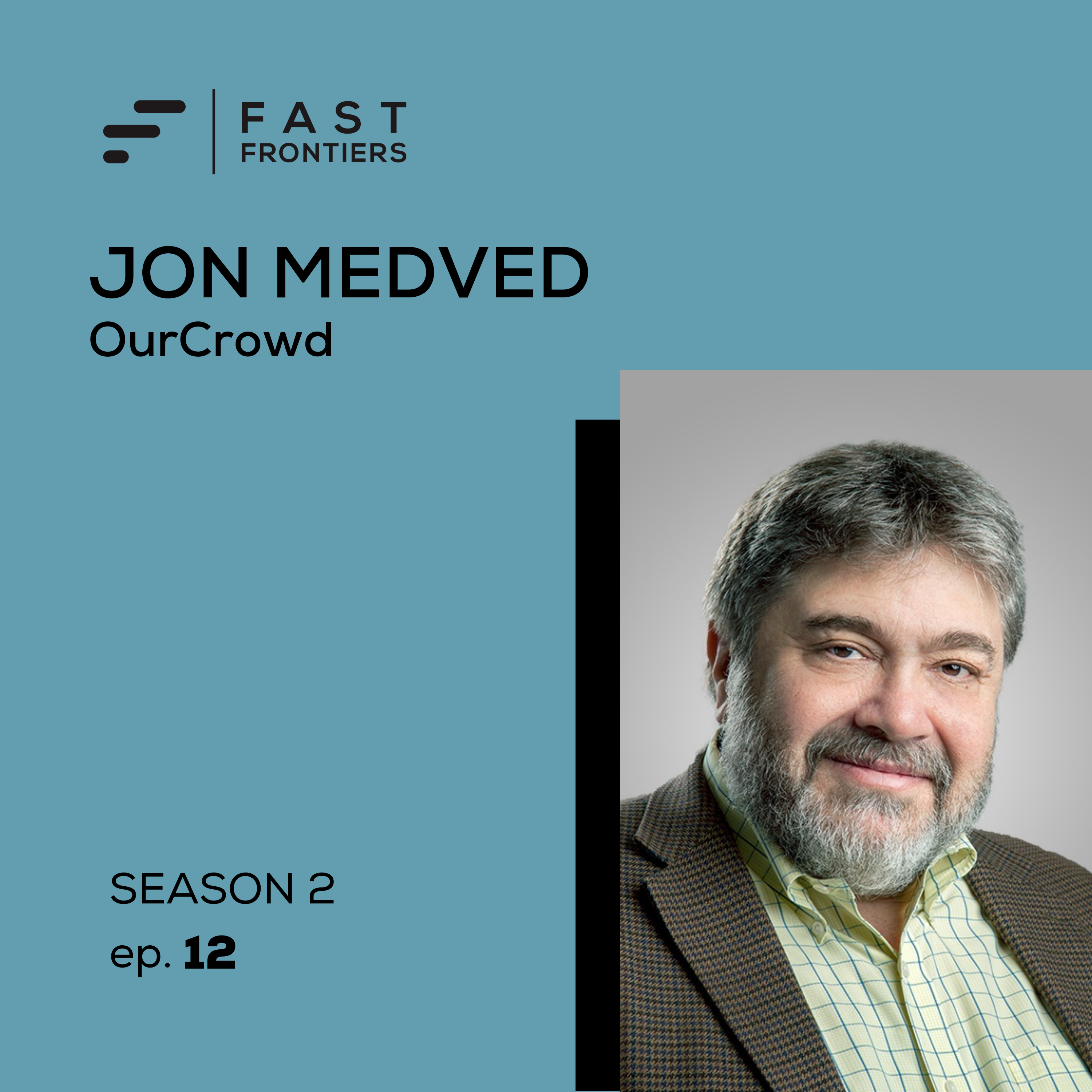S2 Ep 12. Jon Medved: OurCrowd
- 0.5
- 1
- 1.25
- 1.5
- 1.75
- 2
Tim Schigel: Welcome to Fast Frontiers. I am your host, Tim Schigel, Managing Partner of Refinery Ventures. In today's episode, we're bringing you my conversation with Jon Medved, founder, and CEO of OurCrowd in Israel. We're going to talk about how Our Crowd is democratizing venture investing for investments and investors globally. The biggest theme or so what I hope you take away from this conversation is this, the uniqueness of Startup Nation Israel. There's a different mindset taught in Israel. They learn not to be afraid to fail, to take risks reasonably, and ultimately be mission-driven, and just get stuffed up. Please enjoy my conversation with Jon Medved. Jon Medved is a serial entrepreneur, and according to the Washington Post, one of Israel's leading high-tech venture capitalists. In the 2008 New York Times supplement, Israel At 60, Jon was named one of the top 10 most influential Americans who have impacted Israel. Jon is the founder and CEO of OurCrowd, the world's largest equity crowdfunding platform for accredited investors, which has raised more than a billion dollars for over 170 companies since its launch in February 2013. In the bestselling book Startup Nation, the authors describe Jon Medved as, " One of Israel's legendary business ambassadors who has taken on that role, that in any other country would typically belong to the local chamber of commerce, minister of trade, or foreign secretary." Prior to OurCrowd, Jon was general partner of Israeli Seed Partners. Jon was raised in San Diego, California, where his father David Medved, a Navy veteran and scientist, and also worked for NASA. Jon attended UC Berkeley in Berkeley, California. Jon, welcome to Fast Frontiers.
Jon Medved: It's great to be here, Tim, thanks for having me.
Tim Schigel: This is so good to catch up. We caught up recently. We met three or so years ago when I was at Cintrifuse and I was fortunate to, well, two things, one, convince you to come to Cincinnati and present at the annual meeting there where you just knocked people's socks off. They couldn't believe. What I heard afterwards was, "How did we get Jon Medved to come to Cincinnati?"
Jon Medved: I'm looking forward to going back. As soon as this pandemic just chills a little bit more, I'll be back in the heartland for sure.
Tim Schigel: Good. We'd love to have you. I also get to attend your Global Investor Summit, which was way more impressive actually. How many did you have at your last summit?
Jon Medved: We had 23,000 registered. We couldn't fit them all in the building.
Tim Schigel: Holy smokes.
Jon Medved: About half of these guys were logging on from 183 countries. But it's really the biggest kind of conference of its kind. We got it in right under the wire there in February. Didn't infect anybody. And we're hoping, this coming year, we're probably going to schedule it a little bit later, probably more towards May and June, hope for the best that things are really under control then with a vaccine. But if not, we'll just stay virtual until we can get back and hug each other. And I mean there's something... Face to face is a lot better than mask to mask. Okay. And we want to go back face to face, but when there's no need for masks, okay, when this thing is under control.
Tim Schigel: That'd be great. I'll have to make sure it's on my calendar. I'd love to attend. I remember going to, I think it was the night... Was it the night before you have your LP meeting? I walked in the hall and Jon Medved opens his arms, he gives me a big hug when I walked in. And I always tell people that story. I mean, this business is all about relationships, trusted relationships. We invest in companies for usually at least six to seven years, if not 10 or more. And it's very important to know who you're investing with.
Jon Medved: Amen to that. I mean, that's actually one of the piece of advice that I give entrepreneurs pretty regularly, which is you should be doing as much diligence on your investors as they do on you. Usually, the entrepreneur, when he gets a term sheet and investor says, they're going to invest X million dollars in his company, he's so over the moon, he doesn't really think about who is this guy? Where's he coming from? What's it going to be like to work with him for years and years and years? And that's really important. And I think you hit it right on the nail, Tim, that this business is a people business. When things go right, it's about people, when they go wrong, it's unfortunately about people.
Tim Schigel: Right.
Jon Medved: So it's fun to work with people you like and trust.
Tim Schigel: Yes. Let's hope so. First of all, to kind of set the stage, can you share just the origin of the idea for OurCrowd and the journey from 2013 to now?
Jon Medved: I've been involved actually for about four decades in building startups, funding them, helping them grow. Started with my late father, Dr. David Medved. We had a company together which pioneered fiber optic transmission systems back in the'80s. We sold it to another good Midwestern company called Amoco, whose technology division was headquarters in Naperville, Illinois. Once that got done, then I moved back to Israel where I got involved in a software startup called Accent Software. Took it public in New York. And then I built one of Israel's first venture capital funds called Israel Seed Partners, and started with a couple million dollars in my basement. And we grew that to be over a quarter billion of funds under management. So then I did another startup, and basically, after taking that company, which was called Bring Go public in New York, again, I went on a speaking tour. Along the way, I become sort of, as you mentioned in the intro, an unofficial spokesman for the Israeli tech ecosystem for Startup Nation, as it were. And this time when I was on the speaking tour in 2012, the response was totally different. People were pushing in my hands business cards. And usually, they'd say something like, "Okay. I'm sold. I want to get into a deal." And then we knew that they couldn't call their broker at Goldman or Merrill Lynch or wherever they add their account and say, "Buy me a startup," because it doesn't work that way. And most of these people, frankly, weren't venture capital class investors, right? Because most venture funds typically have a $5 million minimum. And that's really doesn't work for most folks, even most rich folks. I had this idea with all these cards, sort of piling up. My wife forced me to put them in a shoebox, and one shoebox began another shoebox, as soon as having like this wall of shoe boxes and business cards. And I said, maybe what we can do is we can offer these guys venture capital investments, investments that me and my team pick, and curate, and diligence, we'll put our own money in. We'll manage them, right? In other words, we'll manage the investment that is, not the companies, but we'll sit on boards and report. And we'll let these folks invest in starting $10,000 per deal. And the first reaction when I got when I started socializing this idea to a bunch of my friends, several of them were lawyers, is that "Medved we love you dearly, but you ever heard of a place called Leavenworth?" I said, "Yeah, that's a federal penitentiary." He goes, "Yeah, you better get more familiar with it because if you do this thing, you're headed there. We'll bring you some kosher food." And I said, "What?" And they said, "No, you can't offer private companies to investors online. That's not legal." And I said, "But wait a minute, venture capital's legal, right? Venture capital, you're allowed to basically, if we didn't invest in private companies, how would you ever get anything public, right?" And so that's how the journey began. It started in 2012, 2013, we launched our first deals. It turns out I was right, it was legal because what we're doing is we're simply offering venture capital investments to accredited investors. In the US, in order to participate in OurCrowd or platforms like us, they have to have of a million dollars of net worth outside of your primary dwelling or a $200,000 annual income. And it turns out they're 14 million households in America that meet that requirement, except that, of that group of, frankly, rich people, but a lot of them, less than 1% have ever made a venture capital investment. So that's where I figured we might have some product-market fit. And now you look forward to where we are just to update some of the numbers you gave, we're at about a $1.5 billion of committed funds. We've made 220 individual venture investments where the minimums that someone can come in is $10,000. Last week we closed a $12 million check from a single investor who wanted to invest in one of our companies. And then we have also 22 funds where we choose the portfolios and put them together and then investors can invest in those funds, not with a $ 5million minimum, but with a $50,000 minimum. So it's a lot more accessible.
Tim Schigel : So the first thing I noted, first rule of thumb, this could apply to any entrepreneur is, well now debate the shoe box rule. Until you can fill a shoebox of business cards of people that say they want to buy what you have, what you're selling, don't start the business.
Jon Medved: Yeah. Right. But the most important thing is take those out of the shoebox and scan them and get them into outlook or into your database so you can start using all these modern tools, which we've done. I mean, look, it's been a great run and we were right. It turns out that rather than the SEC be our enemy, God forbid, they're our friends. Right? If you look at the current chairman, Jay Clayton, he's talking about how important it is to democratize access to the private market asset class, right? In other words, he feels that because so much money is being made in these venture capital investments before the companies go public, that it's absolutely critical that the SEC and the regulatory environment encourage capital formation and participation. Now they want to obviously protect investor rights and make sure that people aren't taken advantage of. And one of the great things about public markets is the disclosure and the transparency and all of that. And private companies aren't ready for that yet. But on the other hand, he got to give people a chance to invest in these private companies, because today almost all the values being sucked out, or not all of it, but majority of the value is being sucked out before they go public. There are 500 unicorns out there. These are companies that have a billion dollars of market cap, and they're not on the market. They're pre-market. And so you look at a company like Uber, and there might've been lots of people who were excited about that IPO, but that IPO was up at tens of billions of dollars, or it was North of 50, or close to 70. Okay. What the smart investor should have been asking is how come I didn't get a shot at Uber at the $10 million valuation? And the answer was, because you're not a connected guy in Silicon Valley.
Tim Schigel: And even more than that, in case any listeners don't understand how venture funds work, venture funds managers are regulated to a limited number of investors, 99 entities, right? So one of the reasons that the small check can't get into venture fund is just because venture funds can't have that many investors, they're limited. So of course, they're going to take people that can write a bigger check, right?
Jon Medved: Yeah, and there's also issues of how today, for example, they've changed the regs to allow you to do what's called public solicitation, where you can actually take a billboard up, either in route 101 in Silicon Valley or route 128 in Boston, or the equivalent in Cincinnati in Ohio, and you can say, "Hey, invest in Joe's startup." That's completely legitimate today. But what you're required to do then is to actually then do some diligence on the investor to make sure that they are indeed accredited. So you need either to get a letter from their accountant or their lawyer. You have to exercise some kind of caution. Whereas in the old days, when you couldn't solicit publicly, the investor could just attest, checks the box, says, "Hey, I got the million bucks. So let me in." But today on a platform like ours, we actually go through a KYC, AML, Know Your Client, the Anti-Money Laundering, as well as this accreditation process. So it's a new world out there. We've got 60,000 people signed up on our platform from all over the world. And these are all accredited investors.
Tim Schigel: And unlike a blind pool, they get to select company by company, which would inaudible.
Jon Medved: They were able to get into Beyond Meat before it went public. And that's cool because the ideas don't just let everybody into the sort of mediocre deals, but give people access to the best deals. And so Beyond Meat, for example, was the best performing IPO, I think of the last two decades. It went from about a billion dollar market cap to north of 10. It goes, bounces all over the place. But it's been tremendous in just a couple of months, less than two years public. We were in there as a private investor before it went public. Okay. So how cool is that, that an individual in Youngstown, couldn't put 10 grand into Beyond Meat on the same terms at the same price as Bill Gates, who also invested in the same round that we did. And that's about democratization of the asset class.
Tim Schigel: Some might think that when you say smaller investors, smaller check size, that means seed stage, but they're not, right? So what's the distribution of stage for OurCrowd?
Jon Medved: So our sweet spot is series A, which is you start with seed, and then you go to A and B and C. But we invest all the way up to pre IPO. When we got to Beyond it was pretty much at that billion dollar valuation. Okay. And I remember we had a huge debate in the.... And said, "Okay, sure, Medved, we understand that we want to be, what's called stage agnostic, right? We want to both invest early stage all the way up to the later stage, as long as it's private, but a billion dollar valuation really? That'll be our entry point? I'm sure we'd like to get there at the end." But what happened is I had actually eaten those burgers on vacation. And more importantly, my wife and my kids ate the burgers and we were major fans. So that was perhaps, one of the more important diligence points there, which you got to trust your gut. Okay. You got to trust your gut.
Tim Schigel: Literally your gut.
Jon Medved: That's it.
Tim Schigel: That's great. How does your back office work or your staff that does the due diligence, and before you recommend or put a company on your platform, how does that work?
Jon Medved: Here in Israel, we have a pretty unfair advantage in terms of diligence because everybody knows each other. I've said that we've been very invasive in terms of our investigation. We basically really want to know as much as we can before we pull the trigger. We want to call customers. We want to call people the team worked with. We want to understand the market. We want to look at the competition. We want to understand what the product-market fit is. Okay. What are the obstacles to manufacturing, is the business model makes sense? So we're checking boxes and looking and interviewing, doing all that stuff. And then we finally get to the price setting, right? Because unfortunately, we don't have a market here, which is setting prices every minute or every second. We got to go there and say, okay, what's this darn thing worth. And that's really where the artisan, or the artistry, if you will, in this kind of business turns up. Because it's one thing when the company has already product sales and you can examine their P&L, profit and loss statements, look at their balance sheet and run all kinds of financial calculations. What if the darn thing doesn't have the product yet? They're asking you give me the money and I'll build it. So there, you've got a real job to figure out how to price it. And it's quite a process to train somebody how to do it. I had a mentor early on who told me, he said, "Look, Jon, you should be aware that this business that you're getting into is probably the most expensive training program in the world." I said, "What do you mean? I didn't go to Harvard or Stanford, and I know they have high tuition." He goes, "Now, forget the tuition at these Ivy League schools, I'm talking real dinero, real money." I said, "What do you mean?" He goes, "Well, my estimate is it costs about $25 to $50 million to train a venture capitalist." I said, "Based on what?" He goes, "That's what you're going to lose before you figure out this whole thing out."
Tim Schigel: Totally, totally agree.
Jon Medved: Let's hope not. Okay.
Tim Schigel: That gets to another issue that, well, first of all, setting the stage and geographically you're global. So what's the distribution geographically for OurCrowd?
Jon Medved: So right now, a little over 50% of our deals are from Israel, which we were very proud of and we want to continue a strong core out of Israel. Over 40% are already in the US, and the balance, less than 10% are in the rest of the world, Asia, Europe, whatnot. We are totally global because our investor base is global. And we want to have a big funnel. So we get sourced deals from a variety of different inputs. One is CEOs of our companies, entrepreneurs talk to other entrepreneurs and recommend good investors. But another really important source for us is our investor base. So the people who are investing on our platform are bringing us their deals, because these are angels and people that we're investing. Another big source of course, is other venture capitalists, right? We've been sourcing each other deals. I'm excited about some of those deals where we're looking at in your portfolio. I think we're already with one down and more to go together, and that's a good way of doing it. But we're global, both in the investor base and the companies. I believe strongly that the future of this industry is away from the sort of centralization represented by the dominance of Silicon Valley. I love the Valley. Okay. I grew up and was raised in California, went to school across the Bay in Berkeley, but it's really important to realize that innovation is going to come from all over. I think that what you're doing, in the great American heartland is so important because there's so many smart people, and so many smart ideas, and so many great universities, and people involved in the armed forces, and people who come out of great companies who have real experience, and there's just been an imbalance of capital, right? In other words, all the capital was concentrated in the Valley. There, used to be famous, I won't mention his name, but one of the leading venture capitalists said, "Heck if I can't ride my bike to a deal, I'm not doing it."
Tim Schigel: I remember that. I remember those days, right? If it's more than 20 minutes to go to a board meeting, I'm not investing.
Jon Medved: And by the way, look, we have an unbelievable company, it started in Cleveland. That is some Israeli, there is a company called Surgical Theater, who are some Israeli flight simulation guys who teamed up with a US brain surgeon from Case. And they have built the most amazing 3D simulation company for surgery of all kinds. It's really on fire, wonderful company. And I remember I asked these guys when we started looking at the company, I said, "So how come we're getting the shot?" Right? Because at that point, this is six years ago when we were hardly a household name, certainly weren't managing a billion and a half of assets or 200 companies. And they're giving us a real look at their company. It looks like they're going to take our money, which they ultimately did. Thank God. And they said, "Well, we've got a little bit of a problem." And I said, "What's the problems?" And they go, "We talk to venture capitalists all the time. And they get really interested and excited about our story. At a certain point, we know this is going to happen. They say, "Wait, now, where are you guys based again?" And they say, "We're right outside of Cleveland." And they said, "We could set our watches by the five-minute time limit that the rest of the call would last." Because these VCs, whether they were coming from Boston or coming from San Francisco, they just weren't about ready to make the schlep to Cleveland. Okay. And it turns out that one of my staff members was from Cleveland. Okay. And literally, after the first two calls where we got excited, we put them on a plane. He was happy, went to Cleveland, made the investment. And this company has been a huge win for us. And I think on to great things.
Tim Schigel: Wow. And along the lines of the investors in those venture firms, we find out in the heartland, not as many folks, family offices or high net worth folks are in venture for that same reason, right? They don't have the access. There's a industrial accelerator called Generator, Madison, Wisconsin. And the stat that they've pointed out is that 47% of the investors in venture capital are coming from foundations and university endowments in the Midwest.
Jon Medved: Now, there you go.
Tim Schigel: So a huge chunk of capital from Midwest goes out to the coast and doesn't come back. So that's part of the inspiration for this podcast is that innovation is cropping up everywhere. And with the cloud and mobile, there really aren't any limits just as you are just talking now.
Jon Medved: No there aren't. I mean, look, we're invested in companies in Sweden, in the UK, in Germany. We're looking at things in Italy, and in Russia. And there are great universities, great people, and this entrepreneurial drive is pretty much the most exciting thing going on today. If you're a young person and you don't want to be a rock and roll star, I see you know Hendricks, the guys who are on audio here, I've got to see Tim's studio. He's got the coolest collection of guitars with the great picture of Hendrix on the right. But of course he's from Ohio, which is where that rock and roll hall of fame is. So you got to assume that. But if a kid doesn't want to be a rock and roll star or a football icon, or maybe the president of United States, they want to be an entrepreneur, okay. This is the new cultural heroes. And probably be the entrepreneur can do a lot more to change the world. I mean, I'll tell you...
Tim Schigel: Absolutely.
Jon Medved: We've got a company by the way, Tim, that got to share with you. It just went up on our platform literally today. Okay. And it's a great example of entrepreneurship having an impact. Okay. I really think that we don't give enough attention to the fact that the guys who were, and the girls who were building these companies are not just making money for themselves and for their investors. But in many cases, they're solving real problems for the world. So we've got this company called Blue Green Technologies who are fighting toxic algal blooms. Okay. Which if you're a fisherman or you spend time around lakes, then you know that this horrible, toxic, algal bloom stuff is. Is killing the wildlife and killing people. Turns out that about 2 billion people's water supplies are potentially being affected because this stuff, it looks like algae, it's actually bacteria, and it's poisonous. Just a couple of weeks ago, there were these elephants, 300 of them who died in Botswana because their watering hole had this toxic algal bloom. So this is a company out of Israel who invented a way to nano encapsulate a chemical which kills this bacteria. And the problem with all uses of the chemical in the past was that it would sink, okay. You just dump it into the lake, it would go into the sediment. These guys figured out how to essentially package it in a way that it floats because that's where the bacteria floats. So you don't have to use hardly any, and it literally causes this bacteria to go through mass suicide. So in the last couple of weeks, if you just Google it, you'll see that they're in the process of saving Lake O, which is Lake Okeechobee in Florida.
Tim Schigel: Wow.
Jon Medved: Okay. Where of all the rains you guys have been having in the States, the water levels are high and they've got to release water into these estuaries and course way, the channels and whatnot. And they're afraid that it's going to be infected water. So they called Israel, the governor of Florida, DeSantis had met this company on a mission to Israel and he remembered and said, "Okay, get those guys in here." And they're literally working around the clock 24/7, and they are saving this water. And they sent me this video with pictures of American Israeli flags flying. And I said, "How good is this?" Okay? I mean, this is nanotechnology saving water, saving ultimately people's lives and wildlife, making money, because we're investing and we're going to do amazing with this company. Stressing that partnership between Israel and America, which is unshakeable and incredible. And I said, God bless. This is just a wonderful thing. Sometimes you have moments like this in this job because you got to face it. We are blessed to have the best job to sit and listen to people-
Tim Schigel: Absolutely.
Jon Medved: -tell you their dreams and you have a chance to help make them come true. It doesn't get better than that.
Tim Schigel: I agree. 100%. So you've talked a lot about the benefits to the investors. Can you share a little bit about the benefits to the entrepreneurs? Why should they consider OurCrowd versus the more traditional venture fund?
Jon Medved: So look, the first of all, they should do traditional venture funds and OurCrowd. We believe in a big open tent. Okay. And we're not displacing or replacing, God forbid, any traditional venture fund we work with them all the time. But the reason that we get into these good deals is because number one, you now get access to this 60,000 accredited investor pool. And it's not just these guys like to write checks, not once, but over and over again. So it turns out that OurCrowd is really good at following our bets, which is important for these entrepreneurs, right? Because when you raise money, it's unfortunately never a one time deal, right? It's series, seed A, B, C. And what happens is that most venture funds poop out, right? Because they put together a small pool of capital or big pool, but they don't have enough reserves. And so they say, "Look, we've put our money to work, good luck, find other investors." At OurCrowd, it's bringing it on because the more that you grow and you prove that your business is working, we got other investors who want to join the original few who were there and the original few want to double down or triple down or quadruple down, which is great. So that's one of the advantages. The other advantage to make a lot of noise. And today, one of the challenges with these little companies is getting above the sort of background noise levels so you can start getting your message across. We're also really good because of this mass of people and making connections. There are others, but I think that we're hardworking. And I think it's fun to be part of our network. You get to meet people like you at our annual conference, we have a lot of partners.
Tim Schigel: Name some of your biggest corporate partners. I was impressed with that, that we were at your last conference.
Jon Medved: We've had consulting deals where we actually do innovation scouting for companies as diverse as Shell Oil, or Hitachi, or Honda Motors, or Toyota Tsusho, or Halma. We have a whole array. We're partners with very big banks in the US. We have a partnership with inaudible, who is the seventh largest broker dealer, million clients, $300 billion in assets. And their clients, by the way, are now getting access to our deal flow through that partnership. We have a partnership with the second largest bank in Singapore. You will be actually in Thailand with the Bangkok Bank, okay. With KB Honda, the largest bank in Korea, the largest bank in Australia, NAB, The National Bank of Australia. So it just goes on. And now of course, the newest thing is what's going on in our part of the world with this new normalization deal between Israel and the United Arab Emirates. I just came back last week, I was in Dubai, and that is a whole new frontier for us. So when you think about what the world's going to be like with the coming down of what I call the sand shutter, okay, it's sort of like the Middle East equivalent to the Berlin wall, which now down and Arabs and Jews are getting together and not in conflict, but in partnership, okay, it's going to be unbelievable. And that's a really cool thing.
Tim Schigel : One of the other things I was super impressed with that, hope you'd share with others is, it was all captured in the book Startup Nation, which you know very well and you know the authors very well, and you're part of that story. There's I think so many regions around the world could learn from that. I mean, Israel and Startup relation is probably the only other region in the world that comes close to the same level of success as Silicon Valley. Some of that is for reasons that are specific to Israel, right? And your geography and the culture there, the IDF, I think plays a big role in that which is great. And it came out in, when was it? 2000?
Jon Medved: 2009.
Tim Schigel: Nine, right. Can you describe a little bit of kind of the main themes of Startup Nation? And then if you would, 10, 12 years later now, what would you amend or what would you say are additional learnings since then?
Look the most important part of the whole Start-up Nation thesis, if you will, is attitude towards risk, right? In other words, if you don't have a risk acceptance culture, it's going to be hard to build startups. If you have a culture where failure is really the end of the road for you as a person, you've got to leave town, you're not going to do startups. There are certain cultures where the face you lose by losing is just unbearable. Whereas, those of us who were in the startup game, failure is part of the process. And it's not a question of, are you going to fail? At some point, we all fail, right? You can't make every investment work. You can't make every startup that you found work. And the question is, how do you fail? What do you learn from it? What do you do for your next act, et cetera. And in Israel, but we had, and still have a lot of risks existentially. Okay. We're one of the few countries in the world where people are trying to develop nuclear weapons just to over the horizon in order to wipe you out and talk about it openly. They deny that anyone ever tried to wipe us out before, but they are going to do it this time. Okay. Good luck with that. They're not going to, okay. So, but we live with that. And you've been to Israel and you know that we're sort of fun-loving, we're always up in the top 10 of the fun index of countries. We've got great beaches and party scene, and we're big family people. Our birth rate is through the roof and we were 3.1 kids per woman. Okay. Our population is booming. It's kid town. Okay. And yet we live with risks, right? It's just part of our existence. And therefore startups, like really, I'm going to be worried about failing? Sorry. Okay. My kids are, I have one kid who was in intelligence, and other kid is a tank commander, another kid who is a inaudible. That's real risk. Okay. That's startup stuff, that just doesn't compute it, it doesn't correlate. So that's, I think the heart of this, but it also includes immigrants, right? Turns out that the immigrant drive is a big part of startups. People who come from other countries to improve their lives often are risk takers. And there are people who work hard in the US. You look at how many startups have been built by immigrants, and they can be from anywhere. But like America has always been a beacon for immigrants, Israel too. Our people who've come from all over the world, very multicultural. And that's a big part of it. On top of that, you mentioned the army. And again, that's probably our special sauce because most people, I think wrongly think that army is about discipline, about marching, and saluting. In our place, the army is about technology okay. About using the most important technologies to save lives and to protect us. But we do a great job in the army because our kids are taught to ask questions, to work as teams, okay, to take risks reasonably, to lead, okay, to be mission-driven and get stuff done because people's lives depend on it. So a lot of our entrepreneurs came out of leadership roles in the army, or these technology units that are busy tracking bad guys, or trying to protect our networks and whatnot. And you get this thing where we're basically the kids here, what they talk about is startups. And they all assume that they're going to either work for one or start one, and even if they're going to be for a decade or two or a school teacher, they're going to go off to a startup. And guys who were in startups go back and be schoolteachers. We've got one startup, which is in the medical area where the founder was a guy who was eight years in one of these intelligence units, was a computer programmer working on cyber security. He then, after eight years in the army changed gears and went to medical school if you can believe. Became a really strong doctor. Rose to be the deputy head of internal medicine at Israel's largest hospital. And then he decided he was going to use artificial intelligence to write software in order to prevent doctors from making prescription mistakes. Because in field trials at Harvard, they found that 5% of the prescriptions were wrong. Okay. And that company's called MetAware, right? But you get these guys were warrior geeks, okay, who are both doctors and cybersecurity experts, and that's, again, a very special sort of Israeli mix.
Tim Schigel: I'm a big believer of your success begets success. So they're all learning from each other in close proximity.
Jon Medved: Building this community together. I think that will encourage those places that haven't had the sort of blessings of entrepreneurial explosion, like Silicon Valley or Tel Aviv, to really participate. And I think that will only increase.
Tim Schigel: So start building the digital or virtual bridges, not just the physical bridges. Well, thank you, Jon. Those are some terrific insights. This is great conversation. I'm sure we could go on for another hour or so. Any other final words of wisdom for people thinking about the next frontier?
Jon Medved: So look, I think that people have to realize that the business that we're in, in terms of venture capital and picking startups is not a business for next week or next month, or even next year, it's a really, almost a generational thing. I mean, our time horizon on investment typically starts with three years, can be as long as 10, sometimes it goes longer. Okay. And so you got to be patient and you got to do things smartly. You got to build portfolios, right? Not just take one shot on goal because people even Pele misses one shot. But if you get 10 shots, you're going to get some goals. And in our cases, these goals are typically not just paying you back a buck for a buck, but hopefully multiple. We're always looking for that 10X, or God willing, even a 50 or 100X. And also you got to be smart about timing. By realizing that sometimes things look gloomy and dark and it ain't that way. Okay. I mean, right now, for example, there are a lot of people suffering out there. A lot of people unemployed, there are a lot of industries which are reeling, whether it's leisure and hospitality, or aviation, or commercial real estate, retail and physical world hard businesses. But there are a lot of businesses that are really taking off. And the digital economy is going through a huge transformation and that's why their stocks are up. That's why these big tech companies are just roaring at the moment. And so as an investor, you got to be aware of that and say, "You know what, we're in the pandemic, but there are some really interesting opportunities with funds like Refinery or platforms like OurCrowd, where you can really, I think score big in this period of time." History has shown that in these downturns, great companies are built because we're all being tested now. And hopefully when we get out of this and we will get out of this, and technology will be a big part of it, things are going to go back to roaring and we're going to make money, and we're going to tackle these challenges that are facing us all. It's a pleasure, Tim, really. Congratulations on what you're doing. We look forward to growing our partnership with you.
Tim Schigel: Thank you, Jon. Thanks for taking the time with us and good luck to you as well.
Thank you. Be well and bye-bye.
Tim Schigel: Thank you for listening to our second season of Fast Frontiers. We appreciate our listeners for their continued support through your emails, reviews, and sharing it with friends and colleagues. It reinforces for us why we put out Fast Frontiers. We continue to have an amazing time connecting with new and old friends to bring you great conversations about accelerating innovation in unexpected places. We will be back for season three shortly. Thank you again. We'll see you back here soon.
DESCRIPTION
Jon Medved is a serial entrepreneur and leading high-tech venture capitalist. Jon is the founder and CEO of OurCrowd, the world's largest equity crowdfunding platform for accredited investors, which has raised more than $1B for over 170 companies since its launch in February 2013.
Today's Host

Tim Schigel
Today's Guests








